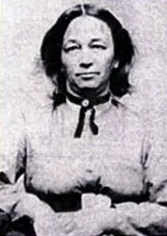Allen Barnes Mayhew was born in Bristol Township, Trumbull County, Ohio to Holmes Mayhew and Lucretia Woodward on February 11, 1826. His father, Holmes Mayhew, was a clothier by trade and had originally come from Massachusetts, emigrating to Trumbull County, Ohio in 1822 where they had a large farm.

Barbara Ann Kagy was born in Bristol to Abraham Neff Kagy and Anna Fansler on January 31, 1833. Her father was trained as a blacksmith and ran a shop in Bristol. Barbara’s mother died in 1838, leaving her to care for her younger siblings, John Henri and Mary. Barbara’s educational opportunities were limited by her responsibilities. In a letter to a cousin, dated December 7, 1848, she writes, “John goes to school now and so does Mary. Pa wanted me to go this winter but I cannot and do the work too; perhaps I shall go next winter if I live and let Mary stay at home.” She would not get the chance to return to finish her education as she became pregnant within the next couple of months and married Allen Barnes Mayhew on May 9, 1849. Their first child, Edward, was born in Bristol on September 21, 1849. A second son, Henry Kagy Mayhew, was born in January 1852.
Allen and Barbara Mayhew migrated to the Nebraska City area from Trumbull County, Ohio, with their two sons in the spring of 1854. John Wallace Pearman noted that Allen Mayhew was one of the “chainmen” on the surveying crew for Nebraska City Town Company on July 10, 1854. The Mayhew family is also recorded in the first territorial census for Nebraska taken on November 20, 1854 as living on government land near Ft. Kearny, Otoe County, Nebraska Territory.
Allen Mayhew had made a claim on 160 acres of land just southwest of Old Fort Kearney (what would become Nebraska City) and built a cabin out of cottonwood logs on the northeast corner of his claim. In the original pre-emption application found in the National Archives, Washington, D.C. is an affidavit which outlined the specific dates of construction. This affidavit states that “the claimant on or about the 15th of July 1855 in person made settlement on the south west quarter sec 8 township 8 north range 14 east by laying a foundation for a dwelling house. Since which time he has erected a dwelling house on said tract into which he moved with his family on 29th August 1855.” The statement goes on to describe the house in great detail and the land in cultivation as quoted in the previous section.
Allen and Barbara Mayhew remained in Nebraska City at their cabin and had six more children. Their only daughter, born in 1854 or 55, Charles was born in July 1856, Thomas born on January 31, 1858, twin boys, originally named John Hannibal and James Hershel, born in April 1860, and Albert Allen born in May 1862. The daughter died in infancy and one of the twin boys died young with the second twin thereafter going by the name Hannibal Hershel. Allen Mayhew farmed several acres near the cabin, harvested grapes and made wine, produced homemade brooms for sale and also worked as a cooper. Allen left Nebraska in 1862, heading for the Snake River Valley in the northwest. He reached Salt Lake City and stayed for the winter, but fell ill and died there on December 1, 1862. The news did not reach his wife for several months.
On April 15, 1864, Barbara Mayhew filed a petition in the local court to settle her husband’s estate. She moved her children into another home located on one of the city lots which her husband had purchased in 1858. The original quarter section (minus the ten acres given to the city for Wyuka Cemetery) containing the 1855 Mayhew cabin was sold to Jerome Lathrop on October 21, 1864 for $2500. The cabin was used by the various owners as a rental property until well into the 20th century. Barbara’s father bought the city lots from the estate and sold them off, lot by lot, over the next several years.
Barbara remarried on February 27, 1865 to Calvin Bradway and moved to his home in Red Oak, Iowa. Her father was appointed the administrator of Allen Mayhew’s estate upon her remarriage and finalized the administration in November 1865, giving Barbara $649.14 as her widow’s third and the balance of $1298.28 to her remaining children. Barbara and Calvin Bradway had three more children, losing a daughter and adopting another son before Bradway was shot and Barbara widowed a second time in 1869. Barbara then moved to her father’s home southeast of town in the Camp Creek area. She died at the age of nearly 49, on January 22, 1882. Barbara is buried in Camp Creek Cemetery located two miles from her father’s homestead. She was laid to rest near her sister Mary who died in 1869 along with her infant child. Three of her surviving sons eventually moved to western Kansas in the mid-1880s along with her father.
